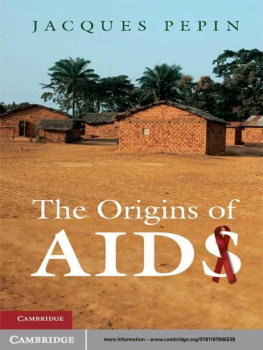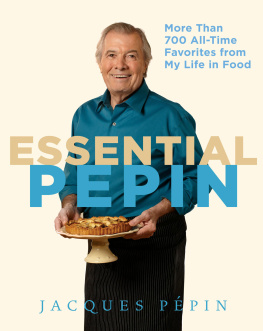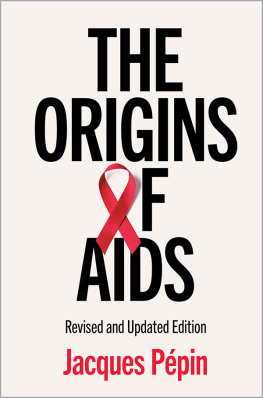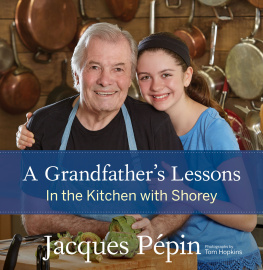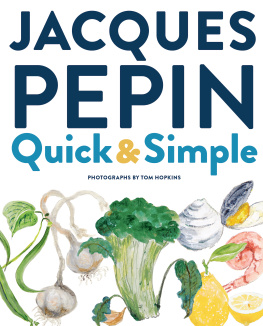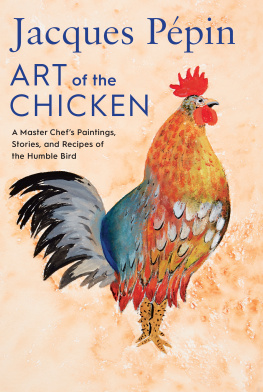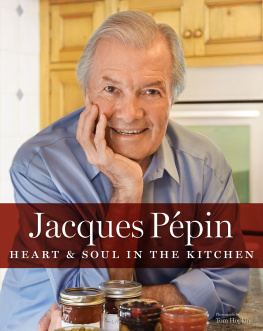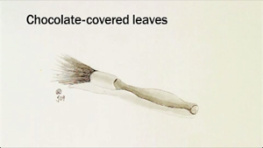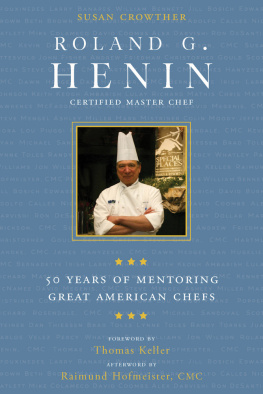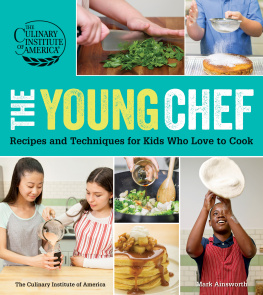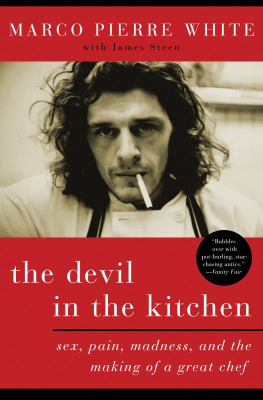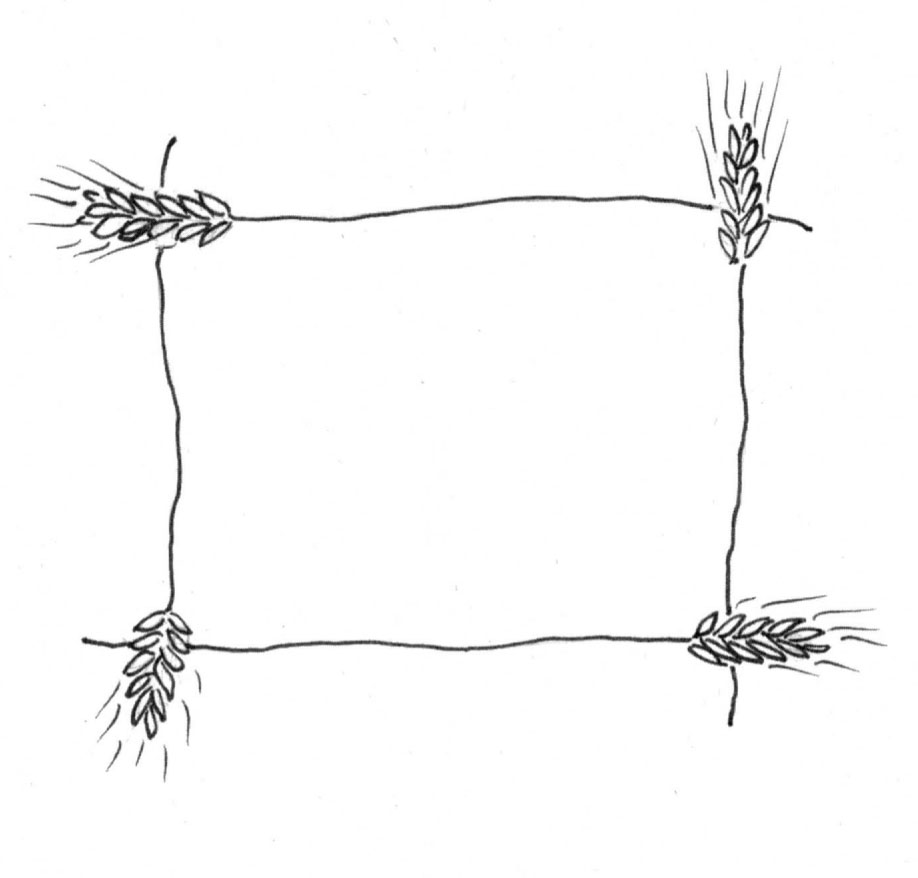
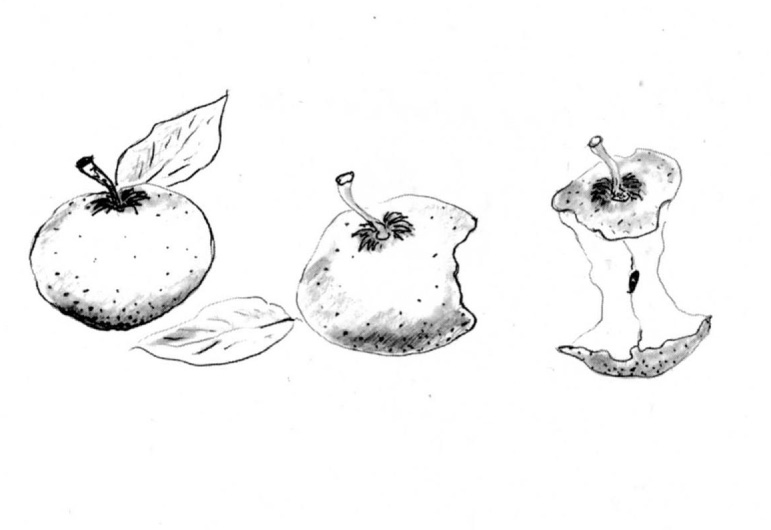
First Houghton Mifflin Company paperback edition 2004
Copyright 2003 by Jacques Ppin
Illustrations copyright 2003 by Jacques Ppin
All rights reserved
For information about permission to reproduce selections from
this book, write to Permissions, Houghton Mifflin Company,
215 Park Avenue South, New York, New York 10003.
Visit our Web site: www.houghtonmifflinbooks.com.
Library of Congress Cataloging-in-Publication Data
Ppin, Jacques.
The apprentice : my life in the kitchen / Jacques Ppin,
p. cm.
Includes index.
ISBN 978-0-618-44411-3
ISBN 0-618-19737-0
ISBN 0-618-44411-4 (pbk.)
1. Ppin, JacquesBiography. 2. Cookery. I. Title.
TX 649. P 47 A 3 2003
641.5'092dc21
[ B ] 2002192158
Book design by Anne Chalmers
Typefaces: New Baskerville, Dalliance, Copperplate
Printed in the United States of America
DOC 10 9
Unless otherwise credited,
all photographs are reprinted courtesy of the author.
I DEDICATE THIS BOOK TO MY TWO BROTHERS,
R OLAND AND B ICHON,
WHOSE LOVE OF GOOD FOOD, OF WINE, OF FAMILY,
AND ESPECIALLY OF LIFE IS REFLECTED IN THIS BOOK.
THEY DEPARTED TOO EARLY BUT WILL
ALWAYS BE PART OF MY LIFE.
Acknowledgments
At the time that this book was going to print, I had the great misfortune of losing my older brother, Roland, to lung cancer, the same sickness that took my younger brother, Bichon, five years ago. Both of them are very much a part of this book and very much in my heart, and I want to acknowledge their important influence on my life.
This book would not have been possible without the help of Barry Estabrook. I started writing essays about my apprenticeship more than fifteen years ago, and always in the back of my mind I thought I would shape them into a book someday. I wrote about my experiences in the kitchen as a child in France, my years in Paris, my life after coming to the States, the way cuisine changed during those years, and what I acquired and learned along the way. Eventually, I had a pile of little stories and anecdotes going back over four decades, but I needed help to shape my rough manuscript into a book. This involved and complex task resulted in hours of lively discussions between Barry and me. I benefited mightily from his clear insights and his grasp and knowledge of good storytelling. His professionalism, unassuming approach, and gentle manner made him a pleasure to work with. He brought the material to life without ever imposing his style of writing or his ideas on me, insisting always on keeping my voice first and foremost, and for this I will forever be gratefully indebted.
I also want to thank Doe Coover, my agent, who not only organized the sale of this book to the right publisher and the right editor, but also suggested Barry.
I want to acknowledge Anne Chalmers, the art director, for the appealing layout of the book and the good use she made of my drawings and pictures.
I particularly want to thank Rux Martin, my editor, whose incisive mind, clear vision, and sharp scissors purposefully improved the manuscript. Her initial confidence never deviated, and her enthusiasm for the project only increased as we got further along.
I thank Norma Galehouse, my assistant, who was involved with this book from its earliest inception. A one-woman business office, Norma does my scheduling and tracks my invoices and expenses. She knows pretty much which assignments I should and should not take, she advises me, and she corrects my mistakes. She has become a trusted friend. She learned to decipher my handwriting and can now read it better than I can. When friends call, asking where I am or when I will be home, my wife, Gloria, usually replies, "Ask Norma." Norma freed me to concentrate on what I do best: cook.
I thank my daughter, Claudine, for her work with me during those years on television, and particularly I thank Gloria, for her love and her understanding, for sticking with me through the ups and downs for so many years, and for the unconditional faith she has always had in me.
Finally, I thank all the people who have been part of my life for the past half-century for their help, support, and love.
1. The War Years
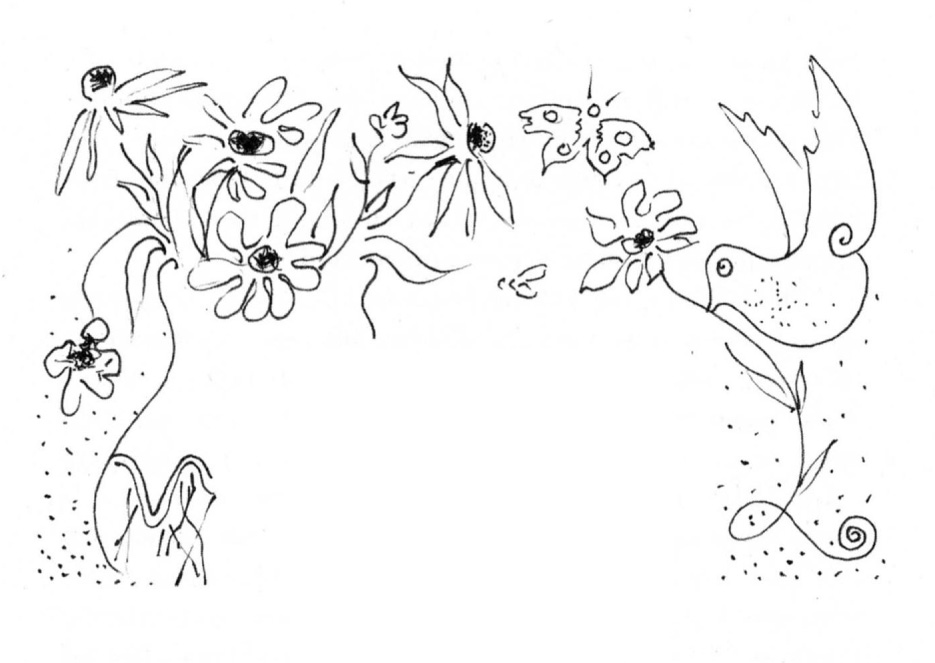
M Y MOTHER made it sound like a great adventure.
"Tati," she said, using the nickname my brother had given me as a toddler, "you are going to a marvelous place. A farm. A real farm."
My six-year-old's imagination filled in the rest of the details. Enormous plow horses. Fat, grunting pigs. Dairy cows with sharp horns and swollen, swaying udders. All manner of fowl: chickens, ducks, geese. Dogs and cats. In short, heaven.
Maman had more practical reasons for sending me to a farm. School had ended, and I would be on summer vacation for the next two and a half months. In towns and cities, food was always scarce in France during the Second World War. In the countryside, farmers may not have had two sous to rub together, but gardens produced vegetables, corn grew in fields, pigs became fat, chickens laid eggs, and cows gave milk that was turned into cream, butter, and cheese. Out of kindness, rural folk would take in the children of townspeople, giving room and board in exchange for chores. Although hearty, the food at the farms was simple and straightforward, coarse and without variety. A gratin of squash with cream, homemade cheeses, roasted or boiled potatoes, and cured pork held in barrels from the previous year were the most common dishes. Occasionally on Sundays, farm families ate roast chicken or rabbit, followed by plum or apple tarts. Nothing fancy, but compared to what we ate in town, this was feasting. In the fall, the children would return home tanner, stronger, and fatter.
The big day came. Maman prepared a picnic lunch. I hopped into a trailer that she towed behind her bike, and together we set off through a landscape of hills, valleys, vineyards, fields, and roadsides shaded by the leafy branches of plane trees. Late that afternoon, we arrived in Foissiat, a hamlet in the center of the rich agricultural region of La Bresse. We pulled into the courtyard of a farmhouse identical to any of a hundred Maman had already pedaled past. It was fashioned from blond-colored mud and round stones and had a red tile roof, plain except for being topped by the ornate and vaguely Middle Eastern-style Saracen chimney. Just as I had imagined, chickens, ducks, and a pair of majestic geese squabbled, quacked, and honked in the courtyard, and a stinky, mud-caked pig grunted in one corner. It was exciting and a bit scary to be that close to real farm animals.
The farmer's wife greeted us, ruffling my hair and cooing. It was a surprising sound, given its source: the tallest, roughest-looking, and most powerfully built woman I had ever laid eyes on. She had a bright red face and wore the traditional peasant's bonnet.
While she and my mother went into the house, the farmer, a big man with a great moustache that curled up at the corners, took me to the barn, which was even more exhilarating than the courtyard. Although I had seen plenty of cows in my day, I had never stood close to one. In that shadowy building, where the sweet scent of hay and raw milk mingled with the acidity of manure and urine, a dozen broad, wet noses turned in my direction. The closest cow, an enormous beast, lifted her tail and hunched her back. I jumped away just in time to avoid being splattered by the resulting mess. That was my first act as an apprentice cowherd.
Next page

